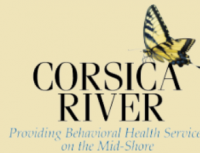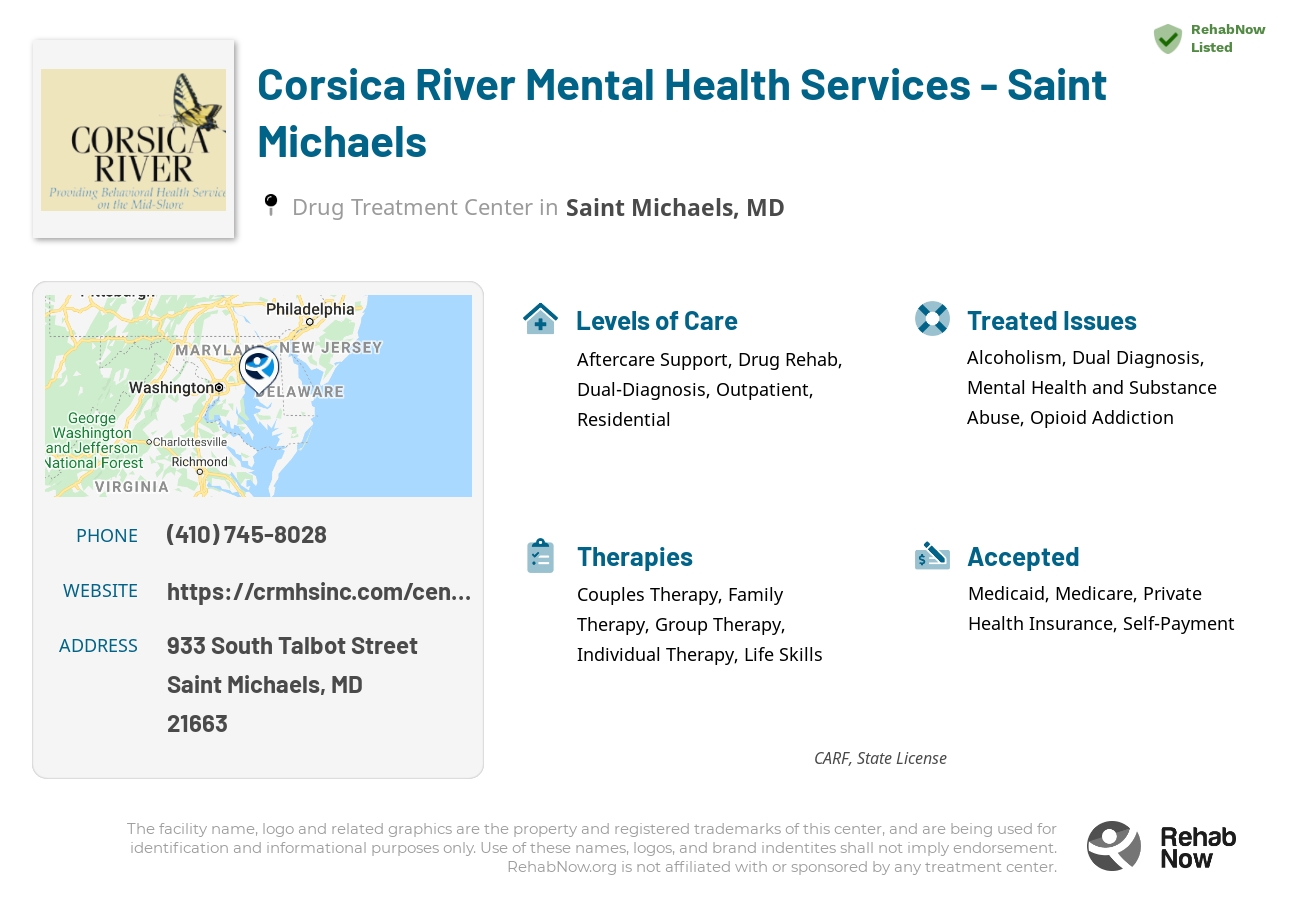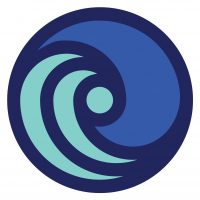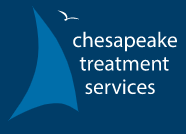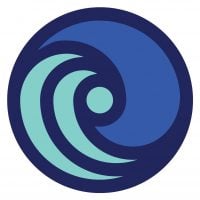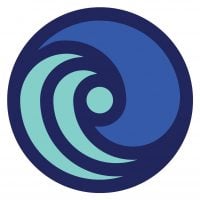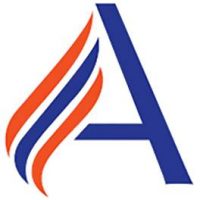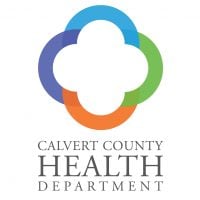Corsica River Mental Health Services - Saint Michaels
Drug Rehab Center in Saint Michaels, Maryland
Corsica River Mental Health Services - St. Michaels offers comprehensive treatment plans for addiction, including evidence-based therapies, life skills aftercare, and long-term residential treatment programs on an inpatient or outpatient basis, with a focus on personalized treatment tailored to the individual needs of each client.
About Corsica River Mental Health Services - Saint Michaels in Maryland
Corsica River Mental Health Services - Saint Michaels, located in Saint Michaels, Maryland, stands out as a non-profit clinic dedicated to mental health and substance abuse treatment. With a mission centered on providing accessible, effective care, this clinic emphasizes human resilience and the importance of maintaining a balanced, healthy lifestyle. Their compassionate approach and belief in the power of support and encouragement make them a unique pillar for individuals seeking sobriety in the mid-shore area.
- Comprehensive Treatment Plans: Offers a blend of evidence-based therapies tailored to individual needs, ensuring a holistic recovery journey.
- CARF Accredited: Recognition by the Commission on Accreditation of Rehab Facilities highlights the clinic's commitment to high standards of care.
- Supportive Environment: Staffed by licensed professionals, the clinic fosters resilience and personal growth, aiding clients in rebuilding their lives.
Corsica River Mental Health Services - Saint Michaels is accredited by the Commission on Accreditation of Rehab Facilities (CARF) and holds a state license, ensuring high-quality care for adults, adolescents, and children. Their multi-disciplinary approach to treatment showcases their commitment to personalized, effective therapy and support.
Specializing in tackling addictions, including alcohol and opioid abuse, the clinic employs a variety of treatment methods such as cognitive behavioral therapy (CBT) and family therapy. Offering both inpatient and outpatient services, they are dedicated to guiding individuals through their journey to sobriety with care and professionalism.
Genders
Ages
Modality
Additional
Accreditations
State License

CARF
The Commission on Accreditation of Rehabilitation Facilities (CARF) is a non-profit organization that specifically accredits rehab organizations. Founded in 1966, CARF's, mission is to help service providers like rehab facilities maintain high standards of care.
Conditions and Issues Treated
Opioid addiction starts when a person becomes addicted to legal or illegal opioids. The addiction can happen quickly, in just a matter of days. Opioid withdrawal can be extremely uncomfortable and lead the user to continue to use even if they want to quit. Stopping using an opioid requires medical observation. Sometimes inpatient treatment with a medically supervised detox is necessary for managing the withdrawal process while learning lasting tools for maintaining recovery. Medications may be used in some cases of opioid addiction.
Opioid addiction is one of Maryland‘s most prominent forms of addiction. It’s treated by detoxifying the body so that the chemicals from the medications no longer impact them and by therapies to correct behavior and target the root of the problem.
Recovery is not simply about stopping drug use. Recovery is working with addiction while recovering mental health issues that are fueling the addiction in the first place.
Levels of Care Offered
This center offers a variety of custom treatment tailored to individual recovery. Currently available are Aftercare Support, Drug Rehab, Dual-Diagnosis, Outpatient, Residential, with additional therapies available as listed below.
Outpatient treatment is considered the lower intensity level of addiction treatment. It’s ideal for early phase addiction or lower intensity addictions. It may include weekly sessions instead of daily. It may include weekly sessions instead of daily. Peer group support, 12-step programs, and individual counseling may still be involved but at a lesser frequency than an intensive outpatient program. It is a good choice for someone who doesn’t need to go through a medically supervised detox and who has a supportive home environment. It requires motivation and dedication to commit to the program without constant monitoring.
Residential treatment programs are those that offer housing and meals in addition to substance abuse treatment. Rehab facilities that offer residential treatment allow patients to focus solely on recovery, in an environment totally separate from their lives. Some rehab centers specialize in short-term residential treatment (a few days to a week or two), while others solely provide treatment on a long-term basis (several weeks to months). Some offer both, and tailor treatment to the patient’s individual requirements.
Aftercare support should take place after outpatient treatment has ended. There are a few different types of aftercare support that patients can seek. These include 12 Step, Self-help groups (AA, NA), Therapeutic communities, Long-term, structured sober living arrangements, and Halfway houses (residential treatment centers).
Therapies & Programs
Individual therapy involves one-on-one sessions between the patient and therapist. It provides patients with a safe environment to openly discuss personal and sensitive issues with the therapist. They find the therapist as someone they can trust. Individual therapy aims to identify the core issues that would have led the patient to substance abuse and address them effectively. The therapist can develop patient-specific customized solutions through individual therapy, which aids speedier recovery.
Couples therapy works with clients and significant others in a professional capacity to improve relationship dynamics. This can be helpful for addicts who are trying to marry the idea of recovery into their work, family, social lives – any aspect that has to do with relationships.
Through counseling sessions, addicts will have an opportunity to talk about their addiction with professional partners. These partners can offer feedback and advice on how to get sober while keeping healthy relationships intact. A good couples therapist will help addicts understand their part in an unhealthy relationship dynamic or find ways to deal with anger or resentment from significant others outside of the home.
Family therapy is a group problem-solving that aims to improve communication and relationships between the addict, their family, and sometimes friends. The main goal of family therapy for drug addiction is to create an environment where communication can occur without judgment, hostility, or blame. The therapist is with the family as they learn to communicate differently, especially with the addict when s/he is using. The family can learn to reduce their enabling behavior or rally together and support each other during tough times.
An addict’s family can play a vital part in helping them to avoid relapse because they can spot the warning signs and help them get back on track before it becomes too much of a problem. Family therapy is one of the most effective ways to help addicts stay on the path to long-term sobriety. When a drug addict decides that they want to try and get sober, it takes the support of every person they love to succeed. It can be incredibly difficult for loved ones to watch an addict go through the pain and suffering of withdrawal, but by being there with them and supporting them, they can help to make sure that the addiction never returns.
Groups typically involve meetings with other recovering addicts who can relate to one another’s experiences. They might meet in person or online and typically focus on the process of staying sober rather than overcoming a specific addiction.
In these groups managed by Corsica River Mental Health Services - Saint Michaels, addicts can build a sense of community and develop strong emotional connections with others who understand what they are going through. These beneficial relationships can help addicts overcome their cravings and prevent relapse at any point during the recovery process.
There is hope for people who are addicted to drugs and alcohol. Cognitive Behavioral Therapy (CBT) is the solution. CBT focuses on the underlying thoughts and behaviors that caused the addiction problem in the first place and may cause a relapse. This type of psychotherapy addresses negative feelings common in substance abuse disorders. It helps to change them by restructuring thought patterns. It’s about removing negative thoughts and providing long-term benefits while promoting self-awareness, self-control, and healthy ways to respond to negative thoughts. These sessions can be done by themselves or as part of combination therapy.
Since addiction is a chronic physical and mental illness, addicts need to learn as many life skills as possible. Many drug treatment centers offer life skills activities as part of their addiction recovery programs. Examples include cooking classes, employment training, resume writing seminars, parenting classes, and computer training. Life skills activities help addicts find employment, take care of their families, and give back to the community.
Payment Options Accepted
For specific insurance or payment methods please contact us.
Is your insurance accepted?
Ask an expert, call (888) 674-0062
Corsica River Mental Health Associated Centers
Discover treatment facilities under the same provider.
- Corsica River Mental Health Services - Centreville in Centreville, MD
- Corsica River Mental Health Services - Cambridge in Cambridge, MD
- Corsica River Mental Health Services - Cambridge in Cambridge, MD
- Corsica River Mental Health Services - Federalsburg in Federalsburg, MD
- Corsica River Mental Health Services - St. Michaels in Saint Michaels, MD
Learn More About Corsica River Mental Health Centers
Additional Details
Specifics, location, and helpful extra information.
Saint Michaels, Maryland 21663 Phone Number(410) 745-8028 Meta DetailsUpdated April 15, 2024
Staff Verified
Corsica River Mental Health Services - Saint Michaels Patient Reviews
There are no reviews yet. Be the first one to write one.
Saint Michaels, Maryland Addiction Information
For the past decade, Maryland's rate of drug use and abuse has significantly increased. The overdose rate is currently higher than the national average. This epidemic is due to the many industries where manual labor is required. As soon as prescription opioids were more readily accessible a large part of manual workers started using–and eventually abusing–the painkillers.
Treatment in Nearby Cities
- Rockville, MD (54.7 mi.)
- Takoma Park, MD (44.8 mi.)
- Oakland, MD (176.7 mi.)
- Snow Hill, MD (60.9 mi.)
- Patuxent River, MD (36.3 mi.)
Centers near Corsica River Mental Health Services - Saint Michaels
The facility name, logo and brand are the property and registered trademarks of Corsica River Mental Health Services - Saint Michaels, and are being used for identification and informational purposes only. Use of these names, logos and brands shall not imply endorsement. RehabNow.org is not affiliated with or sponsored by Corsica River Mental Health Services - Saint Michaels.
